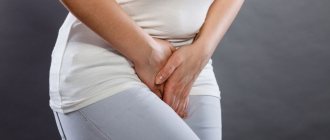| Appointment with a gynecologist in Moscow on the day of treatment | Reception is strictly by appointment, make an appointment by phone: +7 | Prices for services | Reviews about the clinic |
Women are sometimes bothered by pain when their periods are late, and this is understandable. But if there is pain, but there are no periods, then this clearly characterizes a female malfunction in the body and gives a signal to undergo examination by a specialist. Some females suffer from an increase in the size of their breasts and abdomen. Others experience various types of pain in the lower back and abdomen.
Based on your cycle, you can determine whether you are pregnant or not. In addition, different stages of menstruation have their impact on the general condition of the female body. Tearfulness, irritability, and maybe, vice versa, activity appear. This means that when pain appears as during menstruation, but there are no periods, this is a signal of a malfunction in the body. Causes? And they are very versatile.
Make an appointment with a gynecologist by phone or by filling out the online form
| Abortion pills | Select a clinic | Paid gynecologist | HCG tests |
Useful information on the topic:
- Reason for delayed menstruation
- Treatment of delayed menstruation
- Ultrasound for delayed menstruation
- Examination for delayed menstruation
- Diagnosis of delayed menstruation
- Delay of menstruation
Reasons for delay of menstruation by 1 day
There are several reasons for delayed periods, which gynecologists classify as normal. These are puberty (puberty), pregnancy, breastfeeding and menopause (menopause or its beginning). Doctors also include a delay in menstruation by several days in those adolescents who started menstruating a year or a year and a half ago. But there are other far from pleasant reasons for delayed periods.
Pregnancy
This option comes to mind first of all to a woman who is sexually active. Even if there is a pregnancy, tests, even the most expensive electronic ones, do not always show two lines on the first day of the delay. If you can’t wait to find out, you can get tested for hCG. Almost every healthy woman can get pregnant - even the most reliable methods of contraception have errors, and something could go wrong with their use.
Intense sports
If you haven’t exercised for a long time and decided to suddenly start doing exercises every day, or started going to the gym several times a week and increased the load, then the delay in menstruation is justified by the stress on the body. There is most likely nothing wrong with this, give your body a rest, reduce the load and your periods will return.
Weight changes
Those who like to go hungry and suddenly give up meat often experience a 1-day delay in menstruation. Losing weight can lead to a delay in menstruation and changes in the cycle. This also includes obesity, which can cause your cycle to become irregular and cause you to worry about delays. The best way is to eat regularly and engage in moderate exercise.
Stress
Your period may be delayed or come early if you are nervous. The stress must be intense for this to happen. A delay in menstruation by 1 day may be due to a psycho-emotional state: problems in the family, constant emotional stress and overload at work have a negative impact.
The main reasons for the absence of menstruation and the presence of pain
When at the right time you feel pain like during menstruation, but there is no discharge, then you should take action. This state of affairs is not always a sign of something dangerous, but it’s worth going to our clinic for an appointment. First, our gynecologist will advise you to check for pregnancy. If you are not pregnant, but have pain without a cycle, then you need to be wary of an ectopic pregnancy. The signs of such a pregnancy are close to those of premenstrual syndrome, so be sure to take the problem seriously and do not delay your visit to the clinic.
A delay in menstruation sometimes leads to chest pain. You must also contact the clinic. The cause of such pain can be mastopathy - changes in the tissue of the mammary glands.
Articles about abortion:
- Abortion pills
- Consultation with a gynecologist
- How does an appointment with a gynecologist go?
- Surgical abortion
- Diagnosis of sexually transmitted infections in women
- Diagnosis of gynecological diseases
- Treatment of female diseases
- Pelvic ultrasound
- Vacuum abortion
- Pre-abortion examination
- Medical abortion
- Early abortion
- Late term abortion
- Intrauterine device
What to do if your period is 1 day late
If you are sexually active, take a pregnancy test first. If your period comes soon, there was only a delay once and everything is generally fine, then you can relax and attribute the delay to stress and sports or other reasons listed above.
Good to know
Bladder stones: how to get rid of them
But if the delay lasts more than ten days or the cycle has changed and become irregular, then you need to go to the gynecologist and find out what is the reason for the body’s vagaries.
Delayed menstruation and nagging pain in the lower abdomen
Periodic nagging pain in the lower abdomen is familiar to almost every modern woman. Such symptoms are caused by active contractions of the uterus, cleansing itself of tissue that has died during menstruation.
A large number of nerve endings in the abdominal cavity become irritated when the uterus contracts and cause pain symptoms.
Pain in the lower abdomen can be a sign of many different diseases or pathologies of a gynecological nature, diseases of the kidneys, intestines, urethra or spine. But most often, pain in this area is usually associated with disruption of the reproductive system.
Causes of pain in the lower abdomen not related to pregnancy
You can divide the causes of pain into two groups, based on the presence or absence of pregnancy. Painful sensations when the lower abdomen pulls during menstruation or a week before menstruation are usually associated with serious hormonal imbalances, which also affects the strength of contraction. Age-related changes and gynecological diseases can also cause discomfort.
Functional pain, when the lower abdomen pulls during menstruation, often appears approximately within several years after the establishment of the cycle (primary algomenorrhea), and may be a consequence of a reduced pain sensitivity threshold.
Primary algomenorrhea usually does not require drug treatment. It is necessary to eliminate psychological factors and normalize lifestyle. It is recommended to play sports, give up bad habits, avoid stress and hypothermia. If such drugs do not produce the desired effect, contraceptives or non-steroidal painkillers are prescribed, which are selected by the doctor after a full examination.
Secondary algomenorrhea can be associated with chronic gynecological diseases and is observed more often in patients over 30 years of age. In these cases, the stomach feels tight a few days or a week before menstruation, and in the first days of the cycle the pain only intensifies. The cause of secondary algomenorrhea can be endometriosis, adnexitis, chronic diseases of the reproductive system, infectious diseases of the pelvic organs, fibroids, adhesive disease, polyps or intrauterine contraceptives. In these cases, it is impossible to do without consulting a doctor and, sometimes, surgical intervention.
Causes of pain in the lower abdomen during pregnancy
When menstruation is delayed, nagging pain in the lower abdomen can be a sign of ectopic pregnancy, various pregnancy pathologies, miscarriage, premature placental abruption, or uterine rupture. What to do when your stomach feels tight but you don’t have your period? If the stomach is pulled during a delay in menstruation, and the cause is related to pregnancy, the symptoms most often cannot be ignored, and the patient requires immediate hospitalization.
It must be remembered that pain in various areas of the abdomen after menstruation or in its absence can be a signal of problems in the body or inflammatory pelvic diseases, which are otherwise practically asymptomatic. The development of these diseases occurs gradually, causing changes in the structure of the fallopian tubes, disorders and infertility. If the slightest symptoms occur, diagnosis and treatment are necessary to avoid complications.
period
Treatment of menstrual irregularities
Treatment is prescribed by a specialist depending on the reasons that led to this condition, and if we are talking about amenorrhea, then based on its type.
If we talk about the primary type of amenorrhea with undetected pathologies, then the patient is monitored and diagnosed. In addition, complexes of vitamins and minerals may be prescribed to maintain the general condition of the body; the doctor may advise you to protect yourself from stress, play sports, but not much physical activity, and adjust your diet and daily routine.
Most women feel their condition improves after losing weight. This can also be seen in the test results, and for many, the cycle returns after this adjustment to their lifestyle.
For secondary amenorrhea, one of the types of treatment or a combination of them will be prescribed:
- lifestyle changes - sufficient physical activity, a nutritious diet, sufficient sleep time, a normal psychological state have a great impact on the health of a woman’s hormonal system, so it is necessary to normalize your weight and lead a healthy lifestyle;
- treatment with medications – depending on the root cause of the disease, medications are prescribed based on the characteristics of the patient’s body;
- surgical intervention (in extreme cases, if the cause is a tumor, etc.).
Treatment usually lasts about six months. During this period of time, the patient’s hormonal levels may return to normal and menstruation may return. But we can talk about this if we fully comply with all the doctor’s requirements and lead a healthy lifestyle.
Which doctor should I contact?
If your menstrual cycle is irregular, you should first consult a gynecologist. Perhaps the woman is pregnant and the doctor will see this during a standard examination; in addition, she will take a smear test, which can reveal inflammation or infection that could lead to an irregular cycle. If the doctor does not find any pathologies, then it would be better to consult an endocrinologist, since the problem most likely lies in a hormone imbalance.
An experienced endocrinologist, candidate of medical sciences, Georgiy Nikitich Romanov, conducts paid online consultations with patients. This specialist worked for a long period of time in state medical institutions, was the head of the department, and teaches at the department of a medical university. Has the ability to study the medical history, prescribe and correctly interpret the results of the patient’s tests, on the basis of which a diagnosis will be made and the necessary treatment will be carried out. Romanov Georgy conducts medical practice, based on modern knowledge and treatment methods, and helps women eliminate menstrual irregularities.
You can contact a specialist in several instant messengers and social networks, he is almost constantly in touch with his patients, you can find out more here.
Prevention of missed periods
Girls and women need to visit a gynecologist once or twice a year, even if she has no complaints. If you have problems with your cycle, in addition to the gynecologist, it is also recommended to visit an endocrinologist and get tested for sex hormones.
To maintain a healthy state, including the female genital area, you should give up smoking, alcohol, drugs, overeating, lead an active lifestyle and engage in light sports.
Be sure to pay attention to your diet: whether your plate contains protein, carbohydrates and the right fats that are necessary for women’s health. Essential fats include olive oil, yolks, butter, avocado, lean fish, and nuts.
Good to know
The best gynecological clinics in Moscow: top 10 rating according to KP
To avoid problems with your cycle, you need to select safe hormonal contraceptives with the help of a gynecologist-endocrinologist (not on your own!).
A woman should consult a gynecologist if she has not had her period for a week or more.











